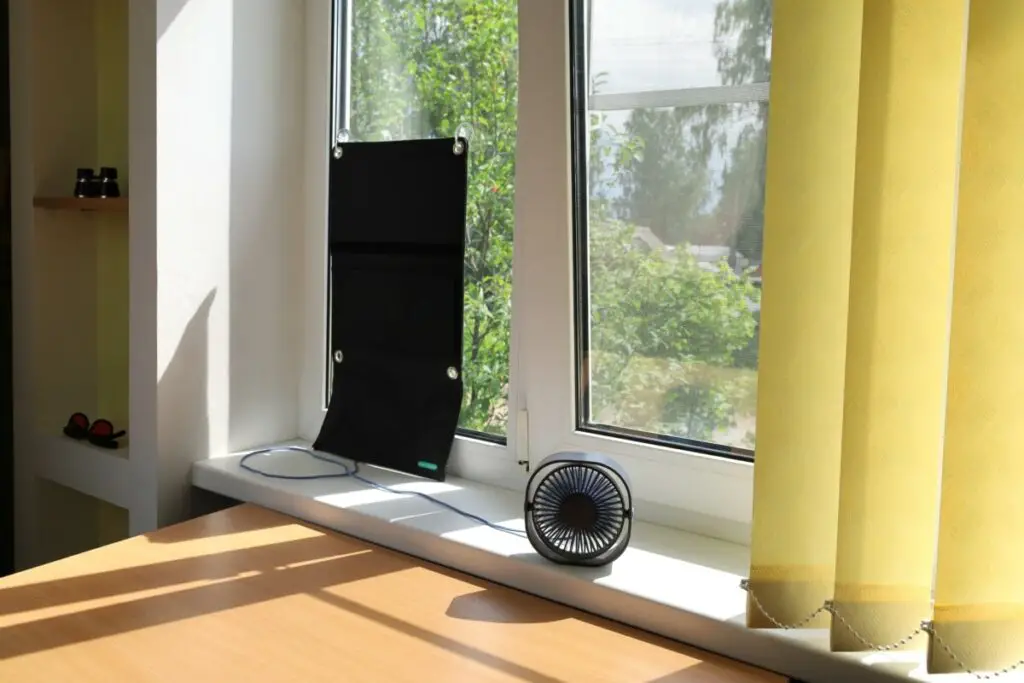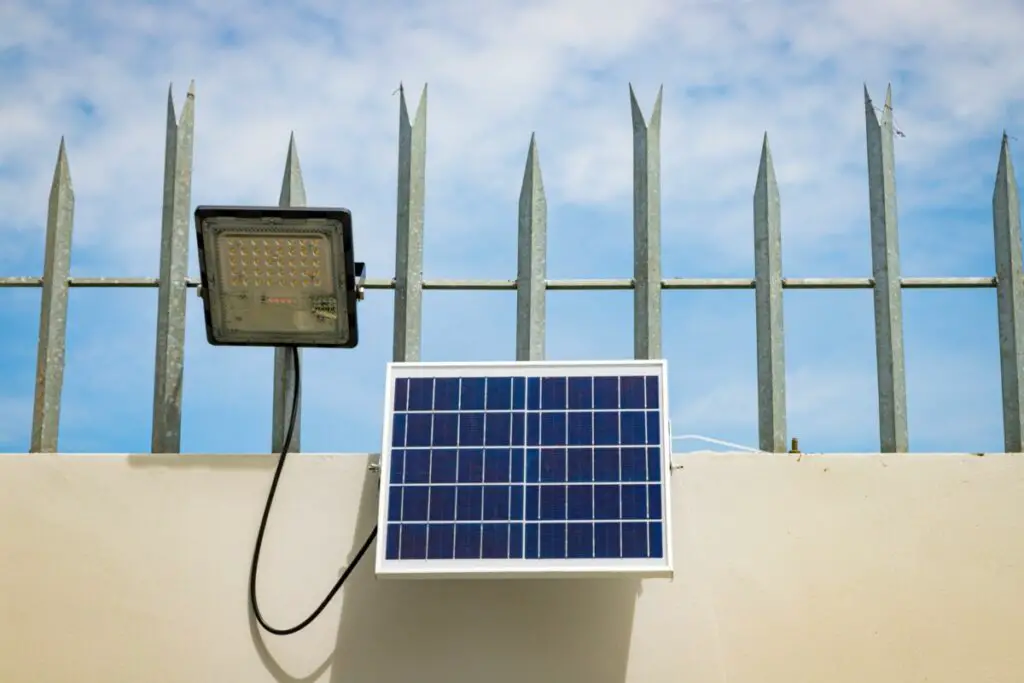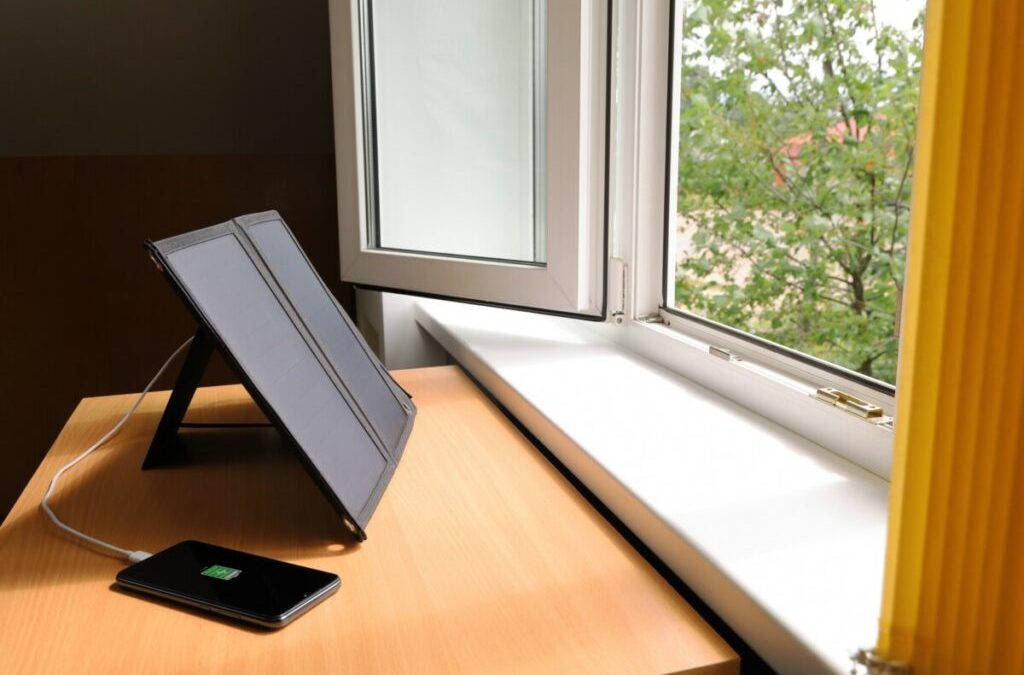With rising costs of electricity making it more expensive to heat or cool your home, you may be looking for ways to slim down your energy bill. While there are simple fixes to cut costs like turning off your lights and unplugging cords when they are not in use, you might be looking for more substantial steps that you can take. For those of you who are interested in solar power, but are not sure if you are ready to commit to a full rooftop worth of solar panels, you may be wondering if you can use a smaller portable solar panel in your home.
Portable solar panels do not provide enough power to power a home. By using a portable solar panel, a battery, and a power converter, a homeowner may be able to power small appliances and electronics using portable solar panels. This can lower electric bills but is not a replacement for grid power.
While it seems like it could be an easy way to save yourself some money, in reality portable solar panels do not have much of a place in your home. If you need to power electronics or some small electrical equipment outside it may be worth your time to invest in portable solar panels as long as you know what their limits are. With this in mind here are some of the things that you can and cannot do with portable solar panels around your home.
Can a Portable Solar Panel Power my Entire Home
When turning on your lights or using your appliances, each costs a small amount of money you may start to fret about the costs of your bills. When using a solar panel you can get energy from the sun for free. Just plop the panel out on your roof or back step and start raking in the energy. The bigger question that people may be asking is whether you can power your entire home only using a portable solar panel.
The unfortunate answer to this question is no, you are not able to power your entire home using portable solar panels. There are a couple of reasons for this that we will go through here below. We will also provide you with some information that may help you resolve some of your misconceptions about portable solar panels.
The main issue with portable solar panels in a situation like this is the amount of power that the panels can provide you. What portable solar panels are great at is powering lights, tools, or electronics. If you are camping or your power goes out a portable solar panel could easily charge your phone or a computer. However, when we are talking about a home there is a much higher level of power that is needed that a portable solar panel will struggle to provide. Think about all of the rooms, appliances, and things that need electricity. Will one portable solar panel be able to power all of those?
The other main concern with powering your home with a portable solar panel is making sure that you constantly have access to power. While using the sun for power is convenient, that also means that you only have access to power while the sun is out. At night you would not have power unless you have a battery or a way to store the power during the day. If you plan on charging a battery using the panel you won’t be able to use it to power your home during that time. If you live in an area where it is often cloudy or the sun gets blocked easily, say by large buildings, you may also struggle to find enough power.

Can a Portable Solar Panel Power my Appliances
While we now know that portable solar panels will not provide enough power to power your entire home, you might be wondering if you can use one of these panels to power your home appliances. While portable solar panels are an excellent choice for things that do not require a lot of power, they might struggle to provide the power that larger appliances require. Let’s look at some common household appliances and determine which of them you could power by using a portable solar panel.
The first thing to keep in mind here is that most appliances will not be able to connect directly to the solar panels. Most appliances will require that you not only already have the portable solar panel, but that you also have a battery in order to store the collected power. Depending on the appliance you may also need a power converter to change the DC current from the solar panels to the AC current used by most home appliances.
With this in mind here are some of the appliances that you may be able to power by using a portable solar panel:
- Small Electronics (phones, computers, etc)
- Small Television
- Radio
- Portable Fans
While this might seem like a short list these are the appliances that fall within the power range of a portable solar panel. These panels generally can provide a max of around 75 watts, and it is often closer to 50 watts of power. This power range excludes many of the appliances that are commonly found in homes. These appliances that cannot be powered by a portable solar panel include:
- Vacuum Cleaner
- Water Heater
- Clothes Washer/ Dryer
- Microwave
- Hair Dryer

Will Using Portable Solar Panels at Home Save me Money
Having looked at whether a portable solar panel can power all of your home, as well as specific things within your home you might be wondering if it is worth your time and money to invest in a portable solar panel. Can you save money by using a portable solar panel at home?
According to one energy company household energy use can be broken down into several categories. Almost half of each home’s electricity goes to powering its internal heating and cooling systems, something that a portable solar panel cannot help with. Water heating and fridges/freezers make up another 30 percent of energy usage.
The only section in which a portable solar panel may help you cut costs is the 11 percent going to non-cooking appliances. Remember that not all appliances can be powered by portable panels so we might expect a 2 to 3 percent energy savings by using one of these panels regularly. With the average US eclectic bill being just over $121 you could expect $2 to $4 of savings each month. Based on these numbers you can expect to save money by using portable solar panels, but the impact may not be worth the investment in the expensive panel in the first place.



Subscribe To Our Newsletter
Join our mailing list to receive news and updates. Don't worry. We will not smap you ;)
You have Successfully Subscribed!